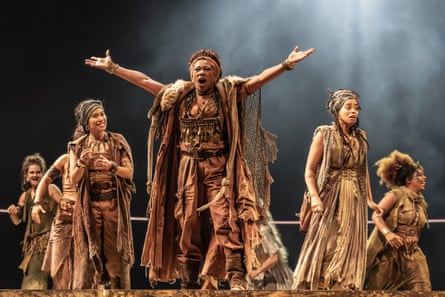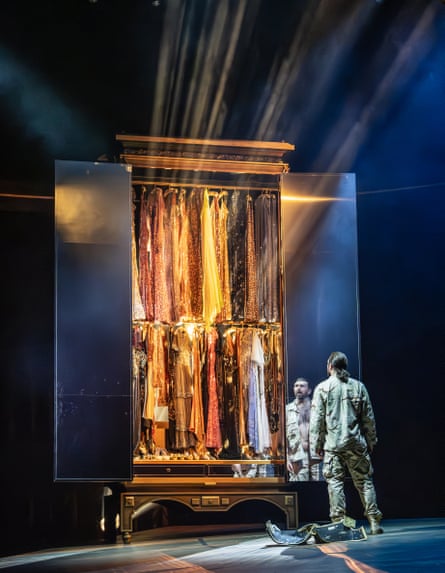It takes courage and some flamboyance to launch an inaugural programme as the National Theatre’s new director with a debut play in the venue’s grandest space. Indhu Rubasingham is throwing down the gauntlet by directing this mischievous and eccentric reworking of Greek tragedy.
The actor turned writer Nima Taleghani’s contemporary take on Euripides, with swearing, sequins and rapped verse, poses a challenge to traditional NT audiences and the canon alike. The play voices its intent in one of many meta-theatrical messages: “Tonight the Artful Dodgers have taken over the Olivier.”
It is a bold, brash takeover with striking optics and energised performances. But just as the Artful Dodger seems like a misplaced reference within Euripidean tragedy, so the script often sounds off-key: unfocused, tonally untextured, its knockabout comedy smothering the emotional core of the play.

Taleghani’s version brings to the fore the fear and suspicion of “foreignness” that creates a backdrop of anxiety in the original text. Dionysos (Ukweli Roach) is denied his godly status by King Pentheus (James McArdle) and is out for revenge, along with a chorus of entranced, outsider women who turn from hunted to hunters. They still live in the mountains here but are labelled “terrorists” by the king.
This barbarian-like band, with a wardrobe reminiscent of Pirates of the Caribbean, is led by Vida (Clare Perkins) and each of the Bacchae are given names and histories. It is a good idea to render a generic female chorus distinct, but these women end up as cliched types, their biographies listed in single line summaries and salient features comically overplayed (one is a hard-nut Scot, another touchy-feely). Dionysos looks like a rapper in a gold hoodie who might have walked off the blingy West End set of Hercules. Poor, prophesying Tireseus (Simon Startin) is an old-school ancient stranded here, as if from a different play.

Characters rap in verse with sentences suffixed by “fam”, “cuz” and “bitches” in a mix of regional accents including MLE. It seems inspired by the Jamie Lloyd school of storytelling (Taleghani starred in his scintillating rap version of Cyrano). The raps burst with verve and a speed of ideas but lack the sharpness, poetry and emotional power to make the satire soar. The humour is hit-and-miss, characters broad and clownish. There is a pun in the name of the king’s attendant, Clitus (Sam Jenkins-Shaw), and Dionysos calls himself a “cunning linguist”. Pentheus is a shouty king who transforms after disguising himself in a dress, to infiltrate the Bacchae, and speaks of the burdens of masculinity before flipping back to tyrant.
This is an accessible, entertaining, new-gen Bacchae but the joshing treatment is frustrating because so much in the original play chimes for our times: the new political puritanism, the unleashed rage of women too long suppressed, and the terrible effects of vengeance and war.
The mother-son story between Pentheus and Agave (Sharon Small) never wields its emotional power. Perhaps the comedy undermines it, or maybe its dramatic focus is lost among so many plot-lines. What is the point of a character called Bubull (Reuben Johnson), who Dionysos meets while disguised and imprisoned by the king? He brings a backstory that simply hangs.
Rubasingham’s direction is nevertheless as polished as ever and the show has pace, with thrilling lighting by Oliver Fenwick, creating filmic effects on Robert Jones’s set of marble Athenian steps and various moving parts. Kate Prince’s movement is a highlight and it is in the interludes of dance, along with DJ Walde’s musical compositions and Ben and Max Ringham’s sound design, that the show feels at its most elemental.
So, while Rubasingham’s high-risk venture does not pay off as a whole, something new, different and daring has entered this old space, and that is no bad thing.

 3 months ago
88
3 months ago
88

















































